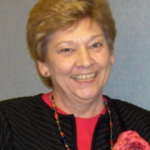 Members of the VSTE Board of Directors will be taking time to periodically share their ideas and passions with the VSTE membership. For this edition, Board Vice Chairperson Michael Speidel discusses his own path to personalized learning.
Members of the VSTE Board of Directors will be taking time to periodically share their ideas and passions with the VSTE membership. For this edition, Board Vice Chairperson Michael Speidel discusses his own path to personalized learning.
No Longer the Sage on the Stage.
I have long been an individual who believes that, if you would like your school to change its instructional practices, you must model and be the change that you wish to see. A few years ago, while conducting a professional development session on how to use our learning management system, I came to the realization that the individuals in the class were all at very different points in their learning. That evening, I struggled with ways that I could meet the needs of all of the learners in the professional development session.
The next day, I developed a “choose your own adventure” professional development activity based on our learning management system. Teachers in the next session would take a pre-assessment that would determine where they would begin their training. Because this was during the “flipped” classroom craze, much of the choose your own adventure professional development was done via YouTube videos that I had created. Besides some of the odd looks that I got from participants as I explained how they were going to learn about our learning management system, the other interesting reaction was that of fellow presenters. Many other presenters looked at me with a “Okay… what do I do now?” face. The presenters were so used to being the sage on the stage that initially this new method of training was something that was uncomfortable to them. Slowly, they began to understand that they could be the coach on the side and help all of the learners meet their needs at one time. This was my initial introduction to personalized learning.
Why Personalized Learning?
This past summer I read a book by Todd Rose called The End of Average: How We Succeed in a World that Values Sameness. In the book, Rose details the history of how the concept of the average individual came to be. There is one example in the book that struck me which was the transition from propeller planes to jet engines. Prior to 1950, all Air Force cockpits were designed around the average pilot. The US Air Force would measure pilots on 10 various body measurements and then design a cockpit around the average measurement of those 10 standards. As the US Air Force transitioned to jet airplanes, they found an increased number of pilot related crashes. Confused about what could be the cause of these crashes, the US Air Force commissioned a study to re-measure 5000 pilots to see if the average measurements had changed and were resulting in the pilot related crashes. The Air Force believed that, if they designed the cockpit around these average measurements, they would have designed a cockpit that would work for the majority of US pilots. When the study was completed, the US Air Force found that, of the 5000 pilots who were measured, not one pilot had the same body measurements as the “average” pilot would have, so they had developed a cockpit that works for no one!
When you think about today’s society, it is a society that is based on the average. Admissions offices, HR departments, banks and doctors make life-changing decisions based on averages. As a matter of fact our entire educational system is based on the systems of average. When you think about all of the students that you had in your classroom as an educator, you know that all those students had strengths and weaknesses. There were no two students who were the same, and there is no such thing as the “average” student. In fact, there is no such thing as the average teacher, the average administrator, or even the average school. This simple yet flawed theory is the reason why personalized learning is so important.
Personalized Learning vs Personal Learning
The terms “personal” and “personalized” have become buzzwords in both technological and educational spheres, with “personal” learning environments and “personalized” search engine results making headlines. Often, the terms are used interchangeably. The difference between personalized learning and personal learning sometimes seems like a matter of semantics, but that could be that terms are used interchangeably when they’re actually not the same.
In a personalized learning environment, much of the content is served up through various platforms; many that are specific to content. Often, these are educational platforms that do not leave much room for personalization. Personalization of learning comes in with how the educator designs their lessons. Personalized learning is like being served at a restaurant. Someone else selects the food and prepares it. There is some customization – you can tell the waiter how you want your meat cooked – but essentially everyone at the restaurant gets the same experience.
On the other hand, in a personal learning environment the learner is the individual who gets to select what and how they wish to learn. Often, personal learning is an item that is equated to project-based learning. Personal learning is like shopping at a grocery store; You need to assemble the ingredients yourself and create your own meals. It’s harder but it’s a lot cheaper, and you can have an endless variety of meals. Sure, you might not get the best meals possible, but you control the experience, and you control the outcome.
Ultimately, if students are to become lifelong learners, they need to be able to learn though a method that works for them. Students need to understand how to forge their own processes, and we as educators, have the responsibility to ensure that they have the necessary skills and tools to meet their varied needs.
Michael Speidel is an instructional designer for Virtual Loudoun at Loudoun County Public Schools.






